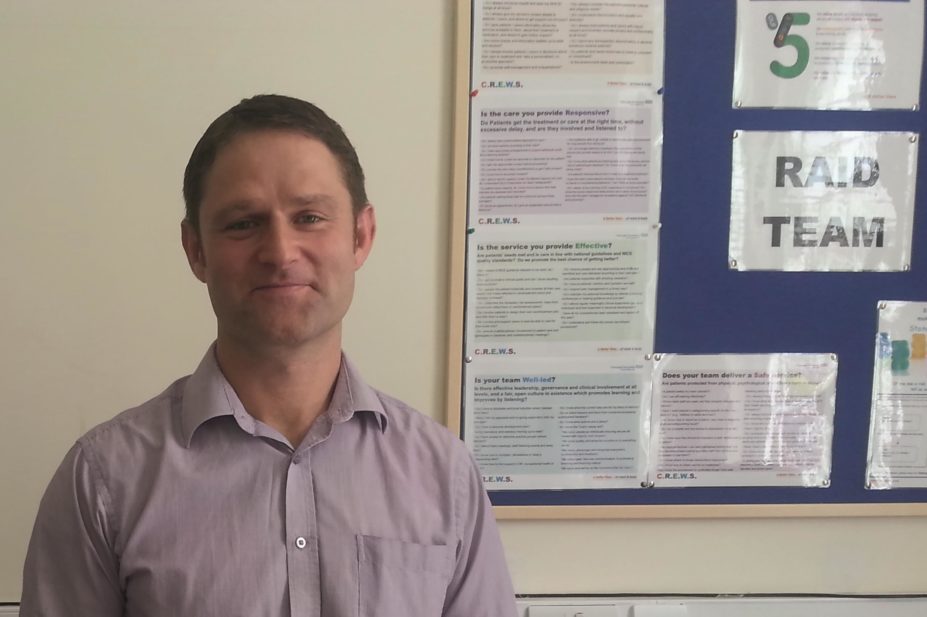
Gregory Price
Mental health specialist Gregory Price works as a psychiatric liaison pharmacist in Wigan as part of a ‘rapid assessment, interface and discharge’, or RAID, team. Price’s role, which few pharmacists in the UK hold, involves providing medication reviews for patients with depression, delirium or dementia.
How did you end up working as a psychiatric liaison pharmacist?
I had been working as a specialist mental health pharmacist for 13 years and had also worked in acute general hospitals — one position was a split post working in both roles. In 2013, the mental health trust, 5 Boroughs Partnership NHS Foundation Trust, expanded the existing psychiatric liaison team in Wigan to include consultant psychiatrists, social workers, psychologists and a pharmacist. The RAID team provides a service to the Wrightington, Wigan and Leigh NHS Foundation Trust.
The original post was for two years, pending an evaluation by the clinical commissioning group (CCG). Although it was a gamble in terms of job security, it was a great opportunity to take on a challenge and demonstrate that a pharmacist could have a significant impact in improving patient care, meeting key performance indicators and contributing to improved medicines management for people in general hospital who experience mental health problems.
What does the role involve?
When the team receive a referral from the acute trust hospital ward and a medication review is indicated, I follow one of three different pathways. These dove-tail into the RAID team pathways, so a medication review is triggered at certain points in the referral process. I aim to complete a review for patients aged over 65 years who have been prescribed low-dose antipsychotics, patients with delirium, and patients with depression or anxiety, or both, who need or are taking antidepressant medicines.
Once I have completed a review, I make recommendations to ward doctors about changes to medicines, any further investigations that may be required to aid diagnosis and additional monitoring that should be done to improve safety. In addition to reviewing medication, I take a detailed medical history.
As part of my role, I have helped develop and deliver a rolling programme of training for pharmacy staff at the acute trust to highlight the risks associated with psychiatric medicines. Topics have included managing the risks with clozapine in an acute hospital and the safe use of medicines for rapid tranquillisation.
I also keep a database of all the work I complete to help demonstrate the value of having a pharmacist in the team.
The CCG funds the team with the aim that the liaison team will make cost savings for the acute trust and improve patient outcomes. These outcomes can include reducing the length of patients’ stay, meeting accident and emergency waiting time targets, reducing readmissions, delivering training to staff, and reducing the numbers of patients who need to be discharged into residential or nursing care.
What do you find most challenging about the role?
I try to complete a medicines review for every patient referred for depression, delirium or dementia, and so the workload can be high and feel relentless at times. Additionally, every patient I see is physically unwell and most are aged over 65 years, which means they can have complicated combinations of issues. Every piece of advice I give has to account for complex medication regimens, comorbidities, ongoing medical issues, risks, mental health history, social issues and capability issues.
It can also be difficult not having contact with other pharmacists who work in the same role to discuss clinical scenarios with or bounce ideas off.
Which parts of the job give you the most enjoyment?
There is a lot of patient contact and hands-on clinical work, which makes the role satisfying and interesting. There are also ample opportunities to use the skills I learnt on the non-medical prescribing course, which has not been possible in previous roles. For example, if patients are referred with depression, I will review their history, past and current treatments, carry out a consultation, initiate or amend their antidepressants as appropriate, and then follow them up for the duration of their hospital stay. If they are discharged I will then see them for a review as an outpatient and further titrate their treatment as necessary. Seeing them several times allows you to build rapport, provide education and ensure they get the best treatment before being discharged to their GPs. Patients seem to value this and getting positive feedback from them is rewarding.
Working closely with the consultants and professionals from other disciplines also makes it an incredible learning environment, where you are always picking up new things. The multidisciplinary team provides a supportive environment where clinical supervision is a constant process and you feel valued as part of the team in the role of medicines expert.
I enjoy the variety of clinical scenarios that I am presented with every day, which provide new challenges and put my problem solving skills to the test.


